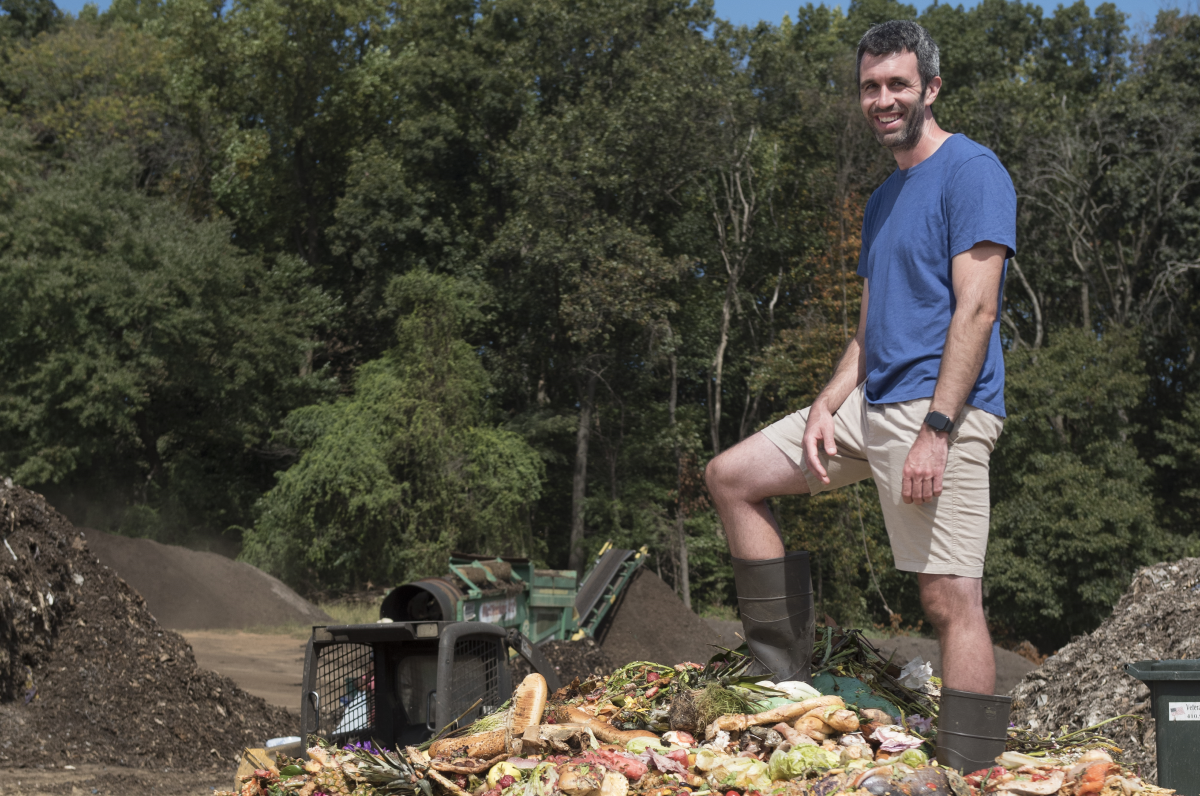A version of this article originally appeared in the January 2020 issue of Military Officer, a magazine available to all MOAA Premium and Life members. Learn more about the magazine here; learn more about joining MOAA here.
Some days on his compost farm, former Capt. Justin Garrity, USA, and his crew pretend to be crime scene investigators as they poke around bones — probably chicken, he hopes — sticking out of the garbage. He plucks slightly damaged flowers dumped from a grocer’s floral department, joking that he should bring them home to his wife.
In 30 days, the seven to 10 tons of garbage piled high at the farm in Aberdeen, Md., will be mixed with woodchips, pumped with oxygen, and transformed into soil. The rich soil attracts everyone from large farmers to the occasional urban porch gardener.
Garrity established his business, Veteran Compost, in 2010 after finishing 10 years as a combat engineer officer for the Army and Army National Guard. He says it was important to establish a sustainable business that gave him a sense of purpose.
“Recycling makes sense,” Garrity says. “I’m not super hippy dippy — I drive a truck that runs on gasoline — but I think those are the kinds of small differences you make to hopefully improve the planet.”
Here's more from Garrity, in his own words:
How the Army Helped
Whether you are officer or enlisted, you learn in the military to just be adaptive. I think a lot of times, people pigeonhole the military as a very rigid, regimented thing. I think that’s very untrue. I can’t think of a mission I had in the Army where we weren’t short time or resources or people, and the mission still had to get done. It’s the same thing here. We don’t have all the equipment and people and money that we need, but we still got to pick everybody’s stuff up and we still got to make the deliveries and still got to not stink up the neighborhood and make sure we run a tight operation. That’s the goal every day: Be adaptive and answer the challenge.
[RELATED: New Year, New Focus: Keeping Your Career on Track]
How Composting Works
If you think back to ninth grade biology class, this is that in action. We collect materials and bring it back here. We also have companies deliver materials to us. We process anywhere from 15 to 30 tons of food waste, then additional amounts of wood chips that gets mixed in with that. The guys will pick out any trash that they might see, and then it will go to [a separate] pile where the composting actually happens. Barrels with air blowers on a timer force air into the pile so that all those microbes, the bacteria, and fungi can break down food waste and wood chips. After getting really hot and breaking down, we take the material and screen it. We feed it in a loader that sifts all of the larger particles from the smaller ones. All of the woodchips and shells that haven’t broken down, we’ll bring them back into the process. What’s left — the soil — will get stockpiled for sale.
[RELATED: 5 Contemporary Military Books to Greet the New Year]
Interesting Sources of Material
We get called into a lot of interesting places. We do obvious places, like grocery stores and restaurants, but we do a lot of things that you might not expect, like corporate offices, lunchrooms, and break rooms from people’s lunches. We do Lush Cosmetics. Everything in their store is compostable. Our guys — a bunch of Army and Navy guys and Marines in company T-shirts — walking into your nice, local mall into a cosmetic store and swapping out their [trash] bin. It’s kind of funny. We do hops from brewery waste. We do Ravens Stadium and VA hospitals.
Grossest Food to Compost
I guess the grossest thing is an acquired thing. I really hate chicken that’s gone bad. Lettuce that’s gone putrid is the worst. So those two things, even after nine years, really kind of turn my stomach. But most of the stuff here you get nose-blind to.



